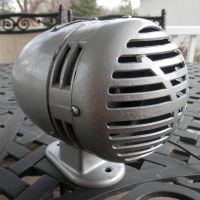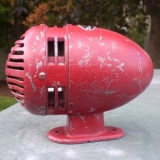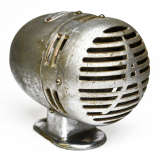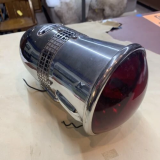Model O and V
| Federal Signal Model O
Federal Signal Model V | |
 A restored privately owned Model O. | |
| Company | Federal Electric
Federal Enterprises Federal Sign & Signal
Federal Signal
|
|---|---|
| Produced | Late-1940s-Late-1970s |
| Type | Directional Electromechanical |
| Voltage | 6 V DC
12 V DC
24 V DC |
The Model O and Model V are small vehicular directional electromechanical sirens which were produced by Federal Signal (at the time Federal Electric) from the late 1940s or so, replacing older models such as the Type 160 series, to at the very latest 1977, when they were superseded by the Model Q. Both sirens are identical, with the only difference being that the Model O is painted, while the Model V is chromed. The sirens were running mates and were both commonly paired together in various Federal advertisements.
Models
Model O

The Model O (often erroneously named the Model 0) makes use of a 6-port rotor and stator, with finger guards on each port to prevent injury from misuse of the siren, as it is small enough to be handheld. Many units have a mesh screen is also wrapped around the stator because of this; whether or not this was the standard or a factory option is unknown. The siren is driven by a small 6, 12, or 24 V motor located behind the stator and is housed inside a large bullet-shaped enclosure, which rests upon a pedestal with 2 holes located on each side of its ovular base, allowing for the siren to be mounted to a flat surface. The base's rear end is flattened as opposed to the Type 160's, which has a perfectly ovular one. Some Federal Electric-era Model O units retained the same mount as the aforementioned siren, though it was likely dropped and replaced soon after the siren's introduction. Compared to the Type 160, the Model O's motor housing is slightly more pointed, and the siren's pedestal is both larger and taller. A bulbous grille with a V cast on to it is bolted to the front of the stator to prevent debris from entering the rotor. The grille used on the Model O is slightly larger than its predecessors. Some units also have a mesh screen located behind the grille to further protect the rotor. The siren was available with a plate with circular openings as opposed to the grille, as was seen on Type 160-C units. Very few units have these, and it is likely that the option was discontinued early on, though this is unconfirmed. Model O units came painted, unlike the siren's running mate, the Model V, which was chromed. The siren is 8" long, 5¾" tall, and 4⅞" wide.
Model V


The Model V (also named Class V) is the chromed variant of the Model O, and both were commonly advertised together. Both sirens are physically identical, with the Model V retaining the same design as the O. The siren uses a 6-port rotor and stator, with finger guards on each port to prevent injury from misuse of the siren, as it is small enough to be handheld. For some units, a mesh screen is also wrapped around the stator because of this; whether or not this was the standard or a factory option is unknown. The siren is driven by a small 6, 12, or 24 V motor located behind the stator and is housed inside a large bullet-shaped enclosure, which rests upon a pedestal with 2 holes located on each side of its ovular base, allowing for the siren to be mounted to a flat surface. No Model V units with a circular plate protecting the rotor, like as seen on some Model O units, are known to exist. All Model V units came from the factory with a chrome finish, although many units have since been painted over, making some Model V units impossible to distinguish from Model Os, aside from the letter that the siren's tag has stamped on. The Model V also had a red-lense light embed which was available to purchase with the siren; units with the light embed are referred to as Model VLs. Interestingly, some units are stamped with the VL name, despite lacking the light embed. The siren is 8" long, 5¾" tall, and 4⅞" wide. The Model V was overshadowed by its painted twin, the Model O, and thus comparatively less Model V units are known to exist.